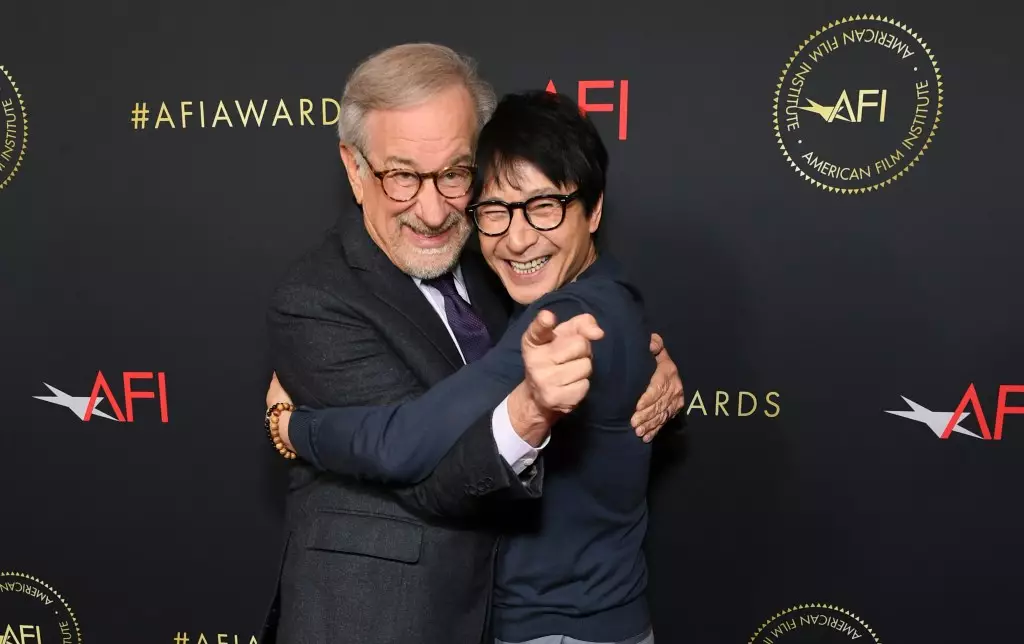Ke Huy Quan’s journey toward starring in action films reflects not only a personal ambition but also a broader narrative about representation and redefining the archetype of the action hero. With the upcoming film “Love Hurts,” produced by Universal Pictures, Quan is not just fulfilling a childhood dream; he is challenging long-standing norms within Hollywood that dictate who can be an action star. For years, Quan has expressed a desire to participate in such films, yet, self-doubt held him back. His fears were rooted in the stereotype that action heroes must possess a certain physicality — an image dominated by muscular icons like Dwayne Johnson, Sylvester Stallone, or Arnold Schwarzenegger.
During an insightful interview with Empire, Quan candidly shared his initial perceptions about the role. His apprehensions stemmed from a deeply entrenched belief that he did not “look” like a traditional action hero. Qualities such as strength, toughness, and heroic stature were often visualized in a specific mold, which Quan did not see himself fitting into. The disparity between his self-image and the expectations of Hollywood illustrates the psychological barriers many actors face, particularly those from underrepresented backgrounds. The pivotal moment in Quan’s transition from doubt to confidence came when the film’s visionary creators extended their offer for the third time, emphasizing their belief in his capability as a leading man.
A transformative encounter with legendary director Steven Spielberg further catalyzed Quan’s decision. At an event, Quan expressed his fears about disappointing fans after his Oscar win, feeling immense pressure regarding his next steps in the industry. Spielberg’s willingness to sit down for lunch and offer supportive advice not only flattered Quan but also shifted his mindset. Spielberg’s words, “It’s great. Do it,” served as a significant endorsement, validating Quan’s potential and reassessing the type of action hero that could emerge from this new iteration.
In contemporary cinema, there is a renewed interest in diverse storytelling and representation, and Quan’s participation in “Love Hurts” symbolizes the potential for change. The film looks to merge traditionally masculine action genres with a nuanced approach to character depth. As the creators seek to fashion a new variant of the action hero, they aim to present a protagonist who encapsulates varied aspects of humanity, making the narrative more relatable.
Beyond the psychological dimensions of taking on this role, Quan also focused on the tangible aspects of preparation. His commitment was palpable as he recounted training for three months to perform his own stunts authentically. This level of dedication resonates with audiences who appreciate the physicality of action cinema. Although Quan noted the rigorous demands placed on his body, including lengthy recovery sessions in salt baths, he expressed exhilaration once he began to see the outcome of his hard work, stating, “I can’t wait to do this again.”
Quan’s enthusiasm for the project and the physical challenges it presents showcase the rejuvenating experience of stepping into action roles at a point in his career where many actors seem to specialize in more contemplative roles. His training process not only builds physical preparedness but also contributes to a sense of empowerment, as he rejects the notion of limitation based on his appearance or previous typecasting.
As Quan’s portfolio expands with projects like “The Electric State” and the recently announced “Fairytale in New York,” it becomes increasingly evident that his foray into action cinema could pave the way for similar representations in Hollywood. It raises essential questions about the future of action storytelling and the essential characteristics of a hero. Will future action films embrace a broader spectrum of what it means to be heroic, allowing for more inclusive and varied representations?
Ke Huy Quan is not merely stepping into the role of an action hero. He is carving out a diverse narrative space that invites audiences to reimagine who gets to be an action lead, while simultaneously proving that dreams, even those delayed, can indeed become a powerful reality. The industry may still have a long way to evolve, but with trailblazers like Quan at the forefront, the path ahead is undoubtedly promising.
